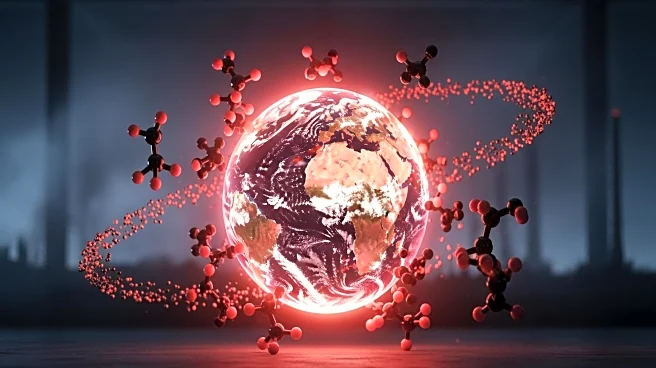What's Happening?
The World Meteorological Organization (WMO) has reported a record increase in global carbon dioxide levels in 2024, marking the largest yearly surge since modern measurements began in 1957. The rise in CO2
concentrations is attributed to increased emissions from human activities and wildfires, coupled with a diminished capacity of land and oceans to absorb carbon. Methane and nitrous oxide levels also reached record highs, contributing to the warming of the planet and extreme weather events. The WMO highlighted the urgency of reducing emissions to mitigate climate change impacts, as global temperatures breached the 1.5 degrees Celsius threshold set by the Paris Agreement.
Why It's Important?
The unprecedented rise in greenhouse gas concentrations poses significant challenges for global climate policy and economic stability. The increase in extreme weather events linked to higher carbon levels results in substantial human and economic losses, emphasizing the need for immediate action to curb emissions. The report underscores the importance of international cooperation in addressing climate change and the potential consequences of inaction, including further environmental degradation and economic disruptions.
What's Next?
Researchers suggest that emissions from fossil fuels may have peaked, potentially leading to a decline in future years. However, the impact of wildfires, particularly in South America, could offset these gains. The WMO's findings may prompt renewed efforts to strengthen climate policies and enhance carbon sink capabilities. Governments and environmental organizations are likely to intensify their focus on sustainable practices and technologies to reduce emissions and improve carbon absorption.
Beyond the Headlines
The report raises concerns about the long-term effectiveness of natural carbon sinks, such as forests and oceans, in absorbing CO2. As global temperatures rise, these ecosystems may become less capable of mitigating carbon emissions, accelerating global warming. The findings highlight the need for innovative solutions to enhance carbon capture and storage, as well as the ethical responsibility to protect vulnerable communities from climate-related impacts.









